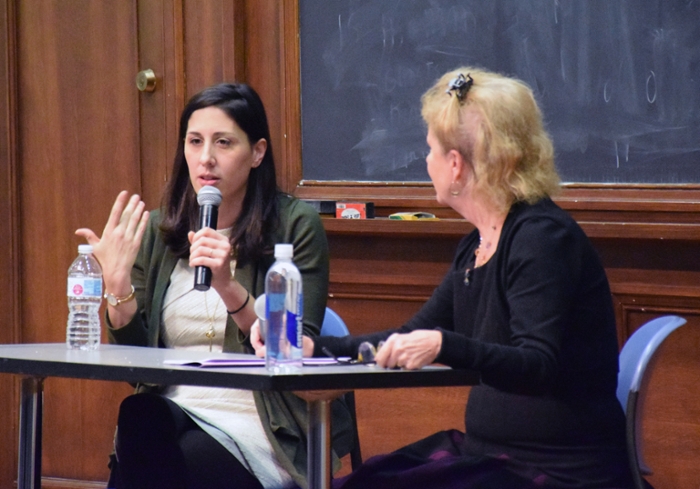What's Next for Healthcare?
Vox’s Sarah Kliff discusses what midterms mean for the Affordable Care Act
Get all our news

Sarah Kliff, left, spoke with Medill professor Abigail Foerstner about the future of healthcare following the midterms.
As the dust settles from the midterms, the Affordable Care Act will remain the law of the land for the foreseeable future, and Democrats will increasingly adopt a “Medicare for All” platform, according to Vox senior health policy correspondent Sarah Kliff.
“I definitely see a lot of policy momentum,” Kliff said. “I expect to see a lot of policy debate in this space going forward as you see Democrats coalescing around this as the platform of the party.”
Kliff spoke to more than 100 students and faculty at a November 14 event on the Evanston campus, organized by the undergraduate Northwestern Political Union and co-hosted by the Institute for Policy Research (IPR), the Medill School of Journalism, Media and Integrated Marketing Communications, and the Center for Applied Microeconomics.
“Given the recent repeal of Obamacare and calls for Medicare-for-All, we view U.S. health policy to be an especially important public policy issue in the current era,” said Josh Varcie, a Northwestern undergraduate student from the Political Union who organized the event.
Kliff, who has been covering healthcare since 2009, predicted that efforts from Congress to repeal the Affordable Care Act (ACA) will wither as the Democrats take back control of the House in January.
Insurance coverage is also expected to reach as many as half a million new people after voters passed Medicaid expansion measures in three states and elected two governors with similar proposals, she said.
But policies implemented by President Donald Trump can still limit the effectiveness of the 2010 healthcare law.
“I see what’s going on in the administration almost as regulatory repeal,” she said during a conversation moderated by Abigail Foerstner, an assistant professor who co-directs Medill’s Health, Environment and Science reporting sequence. “There’s a decent amount that the Trump administration can do and is doing to weaken the Affordable Care Act.”
Kliff said Americans can expect more Democratic presidential hopefuls to push for “Medicare for All,” a policy few embraced during the 2008 campaign. This ideological shift comes after failed Republican efforts to repeal the ACA, which drew public backlash and an increase in the law’s popularity.
Kliff acknowledged the problems of ACA insurance plans, like high premiums and lack of doctor availability in some networks. But she said one distinct problem transcends the entire insurance market.
“At the end of the day, the thing that’s driving all of this is the fact that the United States has incredibly high healthcare prices,” she said. “Our healthcare prices are just a world above the rest of the developed countries and they vary hugely from one place to another.”
Kliff pointed to $629 bandaids—which she uncovered as part of a project to collect emergency bills—as evidence of astronomical healthcare prices, calling it “the tip of the iceberg.”
She suggested Congress could try to tackle prescription drug price regulation, which has been proposed by Democrats. But while this may be good for consumers, innovation is likely to dwindle, she said.
Kliff also touched on the opioid crisis and a need for a broader “cultural shift” of Americans’ “acceptance of pain.” Doctors she has interviewed say they are changing their prescription practices, but modern medicine hasn’t found a true cure for chronic pain.
“We don’t have a great safe treatment for chronic pain,” she said. “The thing we really need is a better understanding of pain .… Sometimes what has to happen is a more realistic discussion of modern medicine.”
Sarah Kliff is a senior policy correspondent at Vox and one of the country’s leading health policy reporters. Read more about her here.
Photo by Alan Perez.
Published: December 10, 2018.